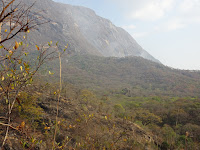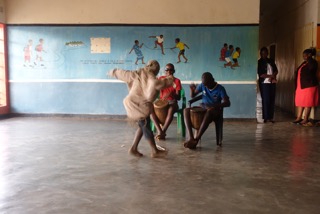As I write,
the drumming of the rains on the roof and rumbles of the thunder create the
atmosphere of fourth Sunday in advent.
This year it seems that the co-incidence between the Christmas season
and the rainy season is according “to the book”.
The opening
song in the Area 18 St. Thomas Anglican church this morning (7 am as usual!)
was Silent Night, and a visiting choir was performing Hark of Angels. No lighting of four candles to bring us into
the “pre-Christmas” mood. But the story
of Elisabeth and Mary who shared their excitement of being pregnant – the one
late in life, and the other as a young woman – with promises that their
respective offshoots were to make significant footprints in history was read. Youth choir and congregation were fired up
through polyphone song and rhythms
that made the hips and feet move, and the hands clap. The reggae tune was complementing the incense
from the alter to fill the room with physical and spiritual sensations. … This was the pre-breakfast service in
charismatic Anglican tradition.
 |
| In our home we have the traditional nativity scene, with figures produced at Dedza Pottery |
In
conversations with my colleagues and other Malawian friends I have learned that
waiting for Christmas break, which is the main vacation season during the year,
is waiting for time to be spent in the village… and in the field. Families living in urban areas return to
their villages to visit family over Christmas. They bring gifts, not
extravagant accessories or luxury gadgets as in Norway, … but soap, sugar,
cooking oil, rice, clothes, solar lamps…
These are commodities that very often are in short supply in the
villages, and Christmas is the occasion for sharing necessities!
 |
| Christmas celebrations in Africa are not quite the same as in Europe! |
While visiting the village, or on return from the village, time is used in the fields. This is the time to plant maize, ground nuts (peanuts), pigeon peas and beans. Many will have started planting earlier, particularly in the southern part of the country that receives the rains earlier than further north. But Christmas holiday is typically the farmers’ season.
While
spending time in the village and in the field, most Malawians spend
considerable time in church, or in social events convened around their church community. The saying goes that Malawi is a “God fearing
country”, and during Christmas the church still has more influence than the
merchants who try their best to advertise their “Christmas bargains” through
radio and newspapers. Christmas can still be a season of joy and
celebration. Contemporary culture is
gradually penetrating the Malawian society, but tradition persists!
P.S. While I wrote this on Sunday, the rains cut off the internet-connection, and I could only send on Monday. This is also part of the preparation for Christmas - and rainy season in Lilongwe. D.S.

















































